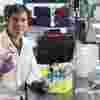Scouts and Soldiers – can we foster an immune interaction to kill cancer cells?
Cancer types:
General cancer research
Project period:
–
Research institute:
Centro Nacional de Investigaciones Cardiovasculares (CNIC)
Award amount:
£206,014
Location:
Spain

Dr David Sancho and his team are investigating if they can foster an interaction between scout like cells called dendritic cells and solider like cells called T cells, to better kill cancer cells. They hope this interaction could be the key to new, more effective cures for cancer patients.
Why is this research needed?
Two of the most current cancer treatments are chemotherapy and radiotherapy which have several unwanted side effects, and which do not work for all patients, so new better cures are needed. One emerging treatment that has gained popularity is immunotherapy, using your own body’s natural defence system and trying to upgrade it to fight cancer more effectively.
Dr David Sancho and his team have an exciting new way to help immunotherapies work better. By improving the interactions between the part of the immune system that recognise cancer cells and the part that attacks cancer cells, they hope to pave the way to better treatments.
I am truly hopeful that treatment for cancer patients will greatly improve in the following decades. One key factor in the recent improvement of cancer treatments is the use of immunotherapies, which help our immune system to identify and attack cancer.
What is the science behind this project?
Your immune system has several cells that work as a team to identify and fight diseases including cancer. One of the most important types of cell are dendritic cells, which act as scouts, seeking out harmful invaders produced by cancer cells and alerting other immune cells that they are there. This includes the T cells which act like soldiers, able to launch an attack on the cancer cells.
However, cancer cells have unique ways of hiding from the immune system, including creating an environment that camouflages the cancer cells, stopping the ‘scouts’ and ‘soldiers’ from doing their job.
Dr David Sancho and his team recognised that the interaction between ‘scout’ dendritic cells and ‘soldier’ T cells correlates with patient survival. The better the interaction, the better the prognosis. In this exciting project, the researchers will look at how to foster this interaction between dendritic cells and T cells by using molecules called “Bispecific antibodies”. These are proteins that can attach to both the dendritic cells and T cells to ensure the best interaction occurs.
What difference could this project make to patients in the future?
Bispecific antibodies are very new and the idea of using them in this way is a creative approach to immunotherapy. By fine-tuning the interaction and making it more efficient Dr Sancho hopes to pave the way towards better treatments with fewer side effects. He believes this project will ‘help uncover essential aspects of this promising therapy’ and that in the future this will improve the quality of life for cancer patients.

Donate today to start new cures
Be part of the united effort to stop lives being cut short by cancer.




